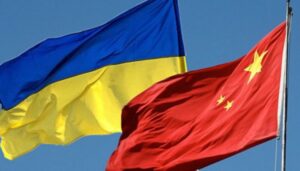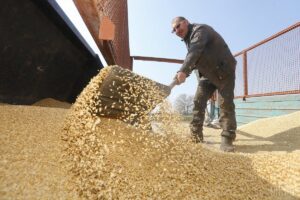
Smart Energy in January-June 2021 reduced gas production by 0.2% (by 300,000 cubic meters) compared to the same period last year, to 199 million cubic meters, the press service of the group said.
In addition, the production of gas condensate by the companies of the group increased by 1.2%, to 17,800 tonnes, liquefied propane-butane – by 12.3%, to 5,100 tonnes.
According to the press service, despite the natural depletion of reservoir energy in the productive horizons of the fields developed by Smart Energy, the group continues to maintain production volumes at a stable level.
“We are keeping our production of natural gas stable, primarily due to our new wells in Poltava region. Taking into account this fact and positive dynamics of price for natural gas, we are planning to spud at least two more new wells in H2 this year,” Serhiy Hlazunov, the CEO of Smart Energy Group, said.
“In February the company spudded one more new development well, No. 29, at Svyrydivske field as well. The target depth is 5,450 meters. Currently the well has reached a depth of approximately 5,250 meters. Drilling operations are ahead of schedule. Subject to successful testing, production hook-up is now expected by the end of Q3, 2021,” the report says.
“Arkona Gas-Energy is getting ready to development of Svystunkivsko-Chervonolutske field (Poltava region). The company is completing supplementary prospecting and exploration as well as design works. During next two months it is spudding well No. 4. Start of 3D seismic is planned for Q4 this year as well,” the company said on its website.
“Preparations for upgrade works to the gas processing plant are in progress. The upgrade includes equipment modernization and increase to the liquids tank storage capacity. The works are scheduled to commence in Q4, 2021,” it said.

Ukraine will receive a part of the vaccines from the United States through the COVAX program, which will be transferred as part of the U.S. plans to purchase and transport 500 million doses of Pfizer and BioNTech vaccines, the U.S. Embassy in Ukraine press service said. “About a month ago President [Joe] Biden announced that he will purchase another 500 million additional doses of Pfizer BioNTech COVID-19 vaccines to contribute to Covax, which is the facility that is sharing these vaccines around the world, including with Ukraine,” the embassy said in the statement.
As noted, the USAID agency located in Ukraine will set up distribution networks and “cold chain” networks that allow the vaccine to be fully ready to go.
“The United States is the largest global contributor to the Covax Facility. We have given over $4 billion to that facility to help distribute vaccines around the world,” the embassy’s press office said.
At the same time, the U.S. government plans to continue to cooperate with Ukraine and other countries to reduce the level of coronavirus (COVID-19) disease in the world.

Ukraine and China have signed an intergovernmental agreement providing for the expansion of cooperation between the two countries and the promotion of joint projects in the infrastructure construction sector, as well as the raising of Ukrainian funds on concessional terms from the People’s Republic of China.
According to the statement on the website of the Infrastructure Ministry of Ukraine on Tuesday, June 30, the relevant agreement was signed by Minister of Infrastructure Oleksandr Kubrakov and Minister of Commerce of the People’s Republic of China Wang Wentao.
Among the priorities of cooperation are rail transit, airports, ports, communications and municipal engineering.
Under the agreement, Ukraine and China will encourage companies and financial facilities in both countries to cooperate actively in the construction of infrastructure facilities, as well as to promote closer economic ties between the two countries and to provide necessary assistance and accompaniment in the implementation of joint projects.
The agreement also provides for the mobilization of funds on concessional terms from the Government of the People’s Republic of China necessary for the implementation of infrastructure projects.
As a result of the joint consultations, the sides will approve potential cooperation projects, which will be supported by PRC funds.

On July, 6, 10 and 11 in Ancient Kyiv in the Principality of Kyivan Rus («Kyivan Rus Park») the large celebration of Ivan Kupala according to ancient traditions, with a rich show-program, horse-trick performances, the unique reconstruction of ancient rites, shooting fireballs from the Trebuchet, the spectacular burning of a scarecrow and round dances around it will take place. Also horse riding, jumping over the fire, master-classes on weaving wreaths and launching them on water, tasty dishes and drinks, traditional Slavic amusements, the possibility to stay for the night in comfortable rooms and a lot of interesting in a real live medieval city will be waiting for the guests!
Ancient Kyiv opens at 10:00.
The beginning of the program on July, 6 – around 18:00 in a relax-format and from 20:00 in full mode, on July, 10 and 11 – around 14:00.
The end of the program:
– on Kupala night from July, 6 to July, 7 and on July, 10 – at 1:00, from 01:00 till 02:00 – Medieval disco;
– July, 11 – at 19:00.
* The program may be changed.
The entry ticket price:
• A full adult ticket: July, 6 – 200 UAH., July, 10 and 11 – 250 UAH.
• for pensioners and students – 150 UAH.,
• for schoolchildren: July, 6 – 80 UAH., July, 10 and 11 – 100 UAH.
• for preschool children – for free.
Ancient Kyiv in the «Kyivan Rus Park» is located in Kyiv region, Obukhiv district, the vill. Kopachiv.
Details on the website www.parkkyivrus.com
The Interfax subscribers can save money with the “openbusiness-20” promo code for a 20%-discount for a full price adult ticket to the Principality of Kyivan Rus:
– by previous order by tel.: +38 044 461-99-37, +38 050 385-20-35
– or at the cash desk at the entrance to the «Kyivan Rus Park».
VOLUME OF CONSTRUCTION PRODUCTS PRODUCED BY TYPE IN JAN-APRIL OF 2021 (MLN UAH)


Ukraine in the 2020/2021 marketing year (MY, July-June) exported 44.63 million tonnes of grain and leguminous crops, which is 21.3% less than in the 2019/2020 MY.
This was reported on the website of the Ministry of Agrarian Policy and Food, while the given data are marked as preliminary.
According to the ministry, the export of wheat by Ukraine in 2020/2021 MY decreased by 18.9% compared to 2019/2020 MY, to 16.44 million tonnes, corn – by 23.9%, to 23.06 million tonnes, barley – by 17.1%, to 4.21 million tonnes, flour exports decreased 2.6 times, to 126,000 tonnes.
According to the Ministry of Agrarian Policy, Ukraine exported 56.72 million tonnes of grain and legumes in the 2019/2020 MY.
As reported, the Ministry of Economy in February of this year predicted a decline in exports of grains and legumes in the 2020/2021 MY by 20.5% compared to the previous MY, to 45.4 million tonnes.